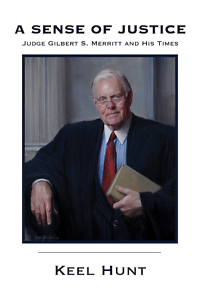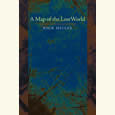A Brave Guy
Keel Hunt chronicles the life and career of a great Tennessee jurist
A Sense of Justice: Judge Gilbert S. Merritt and His Times isn’t just a biography of Judge Merritt. It’s a chronicle of Nashville’s most influential movers and shakers through more than five decades. Author Keel Hunt delivers a detailed account of Merritt’s close association with an array of political and social leaders, along with a stark history lesson about his role in Nashville’s growth from fledgling Southern city to the dynamic “It City” of today.
 Hunt, a journalist for 30 years, was asked by Merritt to write a biography for the judge’s children. Hunt had a strong respect for his subject, having covered his career since Merritt’s first congressional run in 1975. But personal respect and affection aside, Hunt realized the value of telling his story for a wider audience.
Hunt, a journalist for 30 years, was asked by Merritt to write a biography for the judge’s children. Hunt had a strong respect for his subject, having covered his career since Merritt’s first congressional run in 1975. But personal respect and affection aside, Hunt realized the value of telling his story for a wider audience.
“To know his story, in its fullness, is to understand how modern politics of the mid- to late- twentieth century came to be, especially in our region,” Hunt writes in his introduction. “He and his circle were among the South’s earliest Kennedy Democrats in the latter 1950s, and their political strivings, while not always victorious at the polls, did affect the shape of many things, especially in the rise of modern Nashville.”
Merritt died in January 2022, and Hunt manages to encapsulate the key moments in his eventful life, from his formative years at Castle Heights Military Academy in Lebanon through his four decades on the federal bench and his almost-appointment to the U.S. Supreme Court.
“This book not only explores [Merritt’s] remarkable career as a lawyer, U.S. Attorney, and Judge on the U.S. 6th Circuit Court of Appeals, it helps us understand his background, his family, his loves, his passions and his most difficult challenges,” John M. Seigenthaler writes in his foreword. “By any measure, Gil’s life was an extraordinary one.”
 Merritt was just 19 when his father died, and the death by suicide of his wife, Louise, when she was only 32, might have derailed his remarkable career at its outset, but his ability to overcome adversity was a hallmark of his perseverance and dedication to justice.
Merritt was just 19 when his father died, and the death by suicide of his wife, Louise, when she was only 32, might have derailed his remarkable career at its outset, but his ability to overcome adversity was a hallmark of his perseverance and dedication to justice.
Each step in his education, from Yale to Vanderbilt, brought Merritt in touch with distinguished and influential power brokers within Nashville. Hunt points to the adage “It’s not what you know, but who you know” that propelled Merritt’s career forward. “It takes friends to reach the bench,” he notes.
That circle of prominent and politically connected friends, at the local, state, and national level, included future Watergate prosecutor James F. Neal, civil rights attorney George Barrett, federal District Court Judge Thomas Higgins, Tennessean editor John Seigenthaler, Nashville attorney and politician John Jay Hooker Jr., and future Davidson County Sheriff Fate Thomas, to name a few.
“They were the giants of that generation,” Nashville attorney Brad McLean tells the author. “It’s hard to understand any of these people without a Gil Merritt.”
According to Democratic Party activist Larry Woods, Merritt “had the position and status to think through and reflect on the direction we were moving – how fast or slow – and what that meant for everybody, not just for ‘me and my friends.’” Journalist Bruce Dobie adds that Merritt was “an interesting cat… He was a brave guy, obviously.”
But the book is more than a collection of accolades and acclamation. Hunt takes time to recount Merritt’s mettle in the courtroom and beyond, whether it was his opposition to the death penalty, defense of free speech, or support for civil rights and the integration of the Nashville Bar Association.
“How can we hold up the symbol of our profession – a blindfolded lady with a pair of scales – and say to the world that we stand for ‘equal justice for all’ and then tell a fellow lawyer that we will not allow him in our professional organization because he is black, because his skin is not white like ours,” Merritt said in a 1965 debate with segregationist Jack Kershaw.
Hunt also touches on Merritt’s time on the bench, from his influence on more than 100 law clerks to his fellow justices.
“Gil’s nature was perfectly suited to lead, and he was a very good leader,” recalled Judge Jane Branstetter Stranch, who joined the court in 2010. “He understood relationships, he understood authority. He was not apologetic about his positions. He was good.”
Additional material is devoted to Merritt’s longtime relationship with Nashville businesswoman Martha Ingram and his service in Iraq, where he and several federal judges helped build a justice system for the war-torn country after Desert Storm.
While newcomers to “It City” may be unfamiliar with Merritt, Hunt’s book expertly details his impact on Nashville and beyond for future generations of Tennesseans.
*[This article has been updated to correct information about Keel Hunt’s career in journalism.]

G. Robert Frazier is a former Middle Tennessee newspaper reporter and editor now working as a book reviewer and aspiring screenwriter. He has served as a script reader for screenwriting competitions at both the Austin Film Festival and the Nashville Film Festival. He lives in La Vergne.


